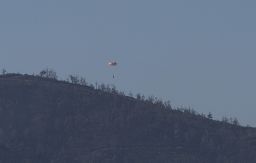Story highlights
Turkey downed a Russian fighter jet near its border with Syria on Tuesday
Turkey says the Su-24 repeatedly violated its airspace; Russia denies this
Two pilots parachuted out of the jet; one is dead, the other's fate is unknown
One of the world’s most complicated geopolitical crises became even more tangled Tuesday when a Russian jet was downed by Turkey in Syria’s Bayirbucak area, near the Turkish border. Here’s what we know so far:
What happened?
Turkey shot down a Russian warplane near the Turkish-Syrian border. The circumstances are in dispute.
The Turks say the aircraft ignored warnings and violated Turkish airspace. They say two of their F-16 jets were scrambled and brought down the Russian plane with a missile strike.
Moscow insists its jet remained in Syrian airspace.
Both sides say they have hard evidence to back up their accounts. Turkey has produced a map which it says proves its case.
Moscow says both pilots on the Su-24 ejected prior to the crash, and there’s video of the pilots parachuting to the ground.
One of the two pilots was killed in the air by fire from the ground, according to Russian state-run news agency RIA Novosti. The fate of the second pilot wasn’t disclosed.
The body of one of the pilots has been found, according to Abu Ibrahim al-Sheghri, the military leader in the 10th coastal brigade and part of the Turkmen Mountain Military Operation Room. The brigade is searching for the other pilot in the same area, he told CNN.
New video published on social media by a Syrian rebel group allegedly shows Turkmen rebels shooting at the two ejected pilots landing on the border between Turkey and Syria.
CNN couldn’t immediately confirm the video’s claim.
Speaking in Turkish language, a man shouts off-camera, “don’t shoot at them” and “capture them alive.”
Heavy gunfire can be heard on the video. The rebels also shout, “God is great!”
Two Russian Mi-8 helicopters performed a search-and-rescue operation, but one of them was damaged by small arms fire and made an emergency landing, Lt. Gen. Sergei Rudskoy said. One Russian marine was killed.
“The helicopter was destroyed by mortar fire conducted from the territory controlled by illegal, armed groups,” Rudskoy said.
The area is home to Turkmen rebels – a Turkic ethnic minority who are fighting Syria’s Assad regime and who have close ties to Turkey.
What’s the reaction in Moscow?
Russian President Vladimir Putin says the downing of the jet is a “a stab in the back by the terrorists’ accomplices” and “will have serious consequences for Russian-Turkish relations.”
The Russians are furious about this, obviously. It’s the first time in decades that a NATO country has shot down a Russian or Soviet war plane, and the first plane Russia has lost since it began its campaign in Syria.
It’s an extremely serious development which could have far-reaching consequences.
What are the ramifications?
First, there are obvious potential consequences for relations between Russia and Turkey, which share close economic ties, particularly since European sanctions on Russia came into effect. Turkey is a popular tourism destination for Russians.
But more significantly, there’s a broader concern about the impact this could have geopolitically, in terms of the Syrian conflict and the war on ISIS.

There’s always been a divide between Russia and the West over what to do in Syria. And Moscow and Ankara are essentially on opposite sides in the conflict, with Russia standing behind Syrian President Bashar al-Assad and Turkey backing rebel forces fighting to topple him.
Was this predictable?
This seems to have been a long time in the making. Russia essentially launched its raids in Syria unilaterally. There was always a danger that it was going to run into other air forces.
Russia has previously apologized for its incursions into Turkish airspace during its Syria campaign – something that Turkish President Recep Tayyip Erdogan warned Russia last month that it “cannot endure.”
There was hope in the wake of the Paris attacks that common ground could be found between Russia and the West in terms of coordination in taking the fight to ISIS. French President Francois Hollande met with U.S. President Barack Obama and will meet with Putin this week, where he is expected to urge greater coordination.
Appearing at joint press conference Tuesday in the White House, Obama and Hollande urged a de-escalation of the crisis. Obama said the plane incident “points to an ongoing problem with the Russian operations” in Syria, which are taking place very close to the Turkish border. There, Russia targets “moderate opposition” to the Syrian regime, Obama said.
Those opponents have the support of Turkey.
If Russia instead focused on fighting only ISIS, “some of those conflicts or potential for escalation are less likely to occur,” Obama said.
The plane incident highlights a complicated picture.
What happens next?
The fate of the pilots will be central to how this plays out.
Russia will presumably present data to back up Putin’s claim that the jet was “was downed over Syrian territory … (while) carrying out an operation fighting against ISIL in northern Latakia.” (ISIL is another acronym for ISIS.)
Russia has something of a checkered recent history when it comes to claims about the movements and activities of its forces, in Ukraine and with the downing of Malaysian Airlines Flight MH17. It’s going to be interesting to see what it produces.
It’s in no one’s interest for Russia to respond to this militarily. But, as Putin’s strong words indicate, we can expect to see diplomatic fireworks.
CNN’s Tim Hume contributed to this report.






